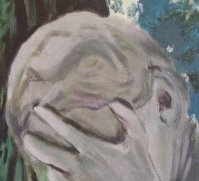 Physical Planning Minister Gopal Man Shrestha advocates a presidential role for King Gyanendra. Finance Minister Ram Sharan Mahat believes the Nepal Army won’t back another palace takeover because it has burned its fingers real bad. Former prime minister Surya Bahadur Thapa accuses the Seven Party Alliance (SPA) government and the Maoists of flouting the spirit of the People’s Movement-II. Welcome to the tortuous world of Nepalese politics.
Physical Planning Minister Gopal Man Shrestha advocates a presidential role for King Gyanendra. Finance Minister Ram Sharan Mahat believes the Nepal Army won’t back another palace takeover because it has burned its fingers real bad. Former prime minister Surya Bahadur Thapa accuses the Seven Party Alliance (SPA) government and the Maoists of flouting the spirit of the People’s Movement-II. Welcome to the tortuous world of Nepalese politics.In a climate where politics and posturing have become the exclusive catalysts of change, it would be unfair to criticize those in responsible positions for speaking from all sides of their mouths. Nor are the three aforementioned utterances totally irrelevant to the ongoing debate.
With Nepali Congress president and Prime Minister Girija Prasad Koirala so firmly behind a ceremonial monarchy, the breakaway faction of the country’s preeminent party certainly couldn’t afford to waste any time. Since Nepali Congress (Democratic) President Sher Bahadur Deuba is out of station, the vice-chairman is entitled to shed light on the party’s position on the crown. Until Deuba overrules Shrestha, we can assume that a pro-monarchy realignment of political forces has begun. Whether there will be a formal unification of the two Nepali Congress factions any time soon becomes immaterial.
Mindful of the storm General Rukmangad Katuwal’s confirmation as chief of army staff has kicked up, the government is mounting every defense it can muster on his behalf. Katuwal may have been the deputy army chief during People’s Movement II. Whether the royal regime’s crackdown on violators of curfews duly and officially imposed can retroactively be considered suppression remains to be resolved. What we know is that Katuwal was second in line to head the army. Depriving the first man outside the traditional Rana-Shah clan of the top job would certainly look bad for a government claiming to have democratized the army.
Critics can make the case that Katuwal, having been virtually adopted by King Mahendra, is the most loyal army chief the palace could ever expect. But, then, those critics would have to devise a way of rediscovering the evolution of the Nepalese military outside the sanctuary of the palace.
Finance Minister Mahat was resting his confidence in the transformation of the army on the top general’s assurances that the force would never betray democracy. Let’s dip a little deeper here. If we accept the democratic mainstream’s claim that King Mahendra’s and King Gyanendra’s power grabs of 1960 and 2005 were in fact military coups, then we must also acknowledge that both monarchs justified their steps as being in defense of democracy. If the military were to intervene again, it certainly would not do so in the name of betraying democracy. Dr. Mahat’s assertion will have stood the test of time.
What’s interesting here is the fact that Dr. Mahat happened to make that bold claim. He was fortunate to have avoided much of the confinement and other torments his Nepali Congress colleagues – along with those from other parties -- suffered under the royal regime.
Reputed to be one of B.P. Koirala’s favorite youths, Dr. Mahat used his furlough to defend Nepal’s 1990-2002 experiment with democracy in the form of a book as well as in newspaper articles and conference papers. He may have made life a little difficult for the palace by complaining to a Washington Post reporter about the ease with which US Ambassador James F. Moriarty swung golf clubs with Crown Prince Paras while Washington criticized King Gyanendra’s takeover. The ruckus Dr. Mahat’s complaint created did allow Washington to clarify its position vis-à-vis the palace in a way that did not hurt the royal regime too bad.
Compounding this convolution is former premier Thapa’s stand that the SPA and Maoists are proving to be a problem to the country. The most liberal face of the partyless Panchayat system, Thapa’s strong contacts span the political spectrum. Considered close to the Indian establishment, Thapa’s reconciliation pleas following the royal takeover have won admiration in the West. The forum he chose to make that accusation – the first Madheshi national conference of his Rastriya Janashakti Party in Janakpur – adds to the significance.
The Nepali Congress, Unified Marxist Leninists and other members of the SPA would have loved to demonize Thapa as a relic of the partyless autocracy. They forfeited that right when they accepted him as prime minister of a coalition government in 1998.
Maoist leader Dr. Baburam Bhattarai was alarmed by the way Thapa, as a member of the legislature King Gyanendra reinstated in April, welcomed the SPA Proclamation and the government’s determination to hold constituent assembly elections. Having broken off the last peace process during Thapa’s premiership in 2003 – when, incidentally all three security chiefs as well as the home and foreign ministers shared the same surname – Dr. Bhattarai’s nervousness is understandable.
With the SPA constituents rushing to describe the “mandate” of the People’s Movement – II in their own ways, Thapa seems to have gauged the mood of the people as well as that of Nepal’s international partners. And, we are told, he has always been the only politician Prime Minister Girija Prasad Koirala ever listens to. Thapa may be the ex-prime minister to watch – yes, even amid the convolution of Nepalese politics.